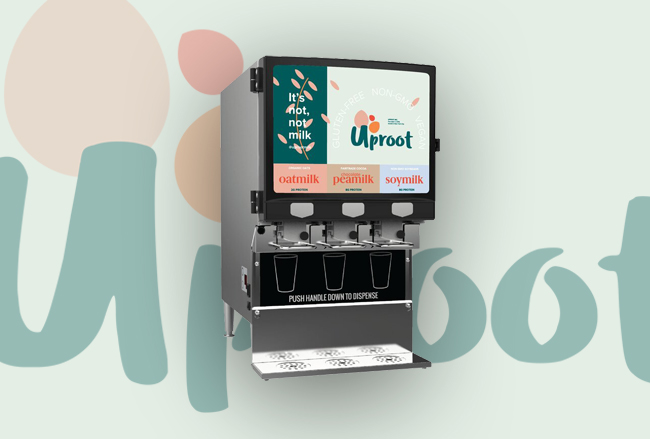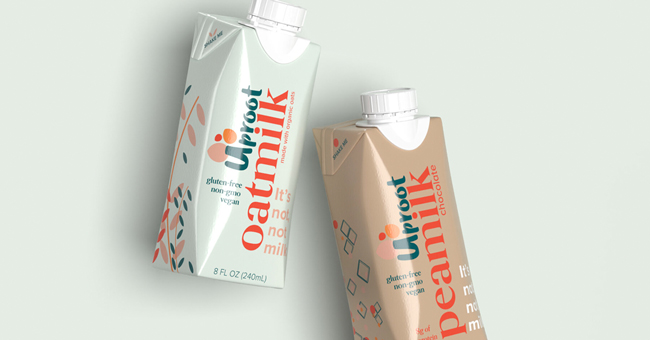As college students went back to school in person for the fall semester, a new plant-milk startup was there to greet them.
Plant-based milk startup Uproot is targeting the higher education channel with a line of dairy alternatives offered through food service beverage dispensers. Founded in 2019 by former Doughbies head of operations and marketing Jacob Conway and Kevin Eve, a recent graduate of Brown University, the brand currently produces Oat milk, Soy milk and a Chocolate Peamilk, with plans to introduce additional innovations in the near future, Conway said.
Based in New York, Uproot’s footprint includes Brown University, Johnson & Wales University and Roger Williams University (Rhode Island), UMass Dartmouth and Stonehill College (Massachusetts), Villanova University (Pennsylvania) and Connecticut College. Now, the two-man team behind Uproot aims to add 25 more higher ed accounts by the end of the year, Conway said, with potential accounts in California and New York. The company is also targeting the hospitality and office channels, with eyes on corporate accounts like Google and Spotify.
“Colleges had always been our first target, for lack of a better term, because it just makes sense,” he said. “They’re already using dispensers for all of their other beverages, you get students in a confined space where they’ve already paid for their meal, it’s usually all you can eat…. So you have a really engaged audience and there’s not a lot of barriers to them trying your product; it’s a perfect environment for dispensed plant-based milk.”
According to Conway, the idea to enter the fast-growing plant-based milk space came from Eve who had been looking to enter the tech industry after graduating in 2018 but, as a lifelong plant milk consumer, saw that even as non-dairy milks had grown significantly in retail and cafes, there was still whitespace for the category in the college and university channel.
Conway, who graduated from Southern Methodist University in 2016, said he was drawn to the idea from his own college experience trying to find non-dairy milks on campus and being saddled with “the one carton of soy milk that they had hidden in the back.”
“There was no variety, you got whatever they had on hand,” he said.
Conway and Eve initially produced all of Uproot’s milk by hand in a commercial kitchen in Rhode Island and sold the brand at Brown and Johnson & Wales, both in Providence. The brand had begun expanding to other schools in March 2020 when the company put operations on pause due to the pandemic. However, Conway said he and Eve used the downtime to strategize and build the brand’s presence in the industry through various business competitions and incubator programs, including the Big Ideas Ventures accelerator.
The company has now closed an angel-driven pre-seed funding round and relocated from Rhode Island to New York as it prepares to scale across the country.
As consumers continue to embrace dairy alternatives, entrepreneurs have begun focusing on new formats to deliver plant-based milks to consumers outside of the traditional CPG format. In 2018, Numilk debuted a proprietary vending machine which produces fresh and customizable plant milk for use in grocery stores and has since launched a home-use appliance. For cafeterias, however, options for dispensed plant-milk is limited with Danone-owned Silk being one of the only providers in the U.S.
Uproot believes it can establish itself in the space by providing quality beverages with more variety, a promise of regular flavor innovation and an emphasis on sustainability. In Conway’s words, the brand isn’t seeking to “reinvent the wheel” and is using standard refrigerated countertop beverage dispensers from a third party provider, which hold 2.5 gallon bag-in-box containers of Uproot’s shelf-stable milks. He noted the machines are not only cost effective for the startup, but also familiar to consumers and cafeteria staff “making installation and operation simple.”
The company also intends to work with additional tech partners to introduce “more advanced” dispensers in the future that are specially designed for food service operations like coffee shops, allowing Uproot to expand into the restaurant sector. Hospitals, hotels, cruise ships and senior living facilities are also on the to-do list.
“We are part of a new wave of high quality food and beverage options in cafeterias,” he said. “Historically, food service products were low cost. Now cafeteria beverages need to be as good, or better than what you can get in the grocery store.”
Conway acknowledged the difficulty for startups attempting to build within the college channel, noting that about 70% of the accounts it currently services are operated by one of several major food service management companies that typically sign exclusive agreements with universities.
Uproot’s expansion comes amid continued sales growth for plant-based milk brands in retail. According to IRI, refrigerated almond milk grew 3.1% to $1.5 billion in the 52-week period ending August 8, while products categorized as “other” (including oat milk) were up 62.5% to $434.3 million. However, soy milk fell 8% in the period to $160.1 million. The growth has benefitted independent brands like Califia Farms and Oatly, while also drawing the attraction of strategics; this spring The Coca-Cola Company introduced a line of oat milks under its Simply juice brand while brands like Silk have introduced oat and almond options.
In addition to the dispensers, Uproot also sells its oat milk and Chocolate Peamilk products online in shelf-stable 8 oz. cartons. The drinks are available on Amazon for $34.99 per 18-pack. While having a CPG option allows consumers who try Uproot in the cafeteria a means of bringing the brand home, Conway said the company is not interested in attempting to compete in a crowded plant-milk set in retail and so far the brand has been able to grow on-premise with relatively little competition.
The focus on dispensers has also allowed the brand to emphasize sustainability by minimizing its use of disposable packaging, he said, a quality that is increasingly important for Uproot’s target Gen Z consumers.
“We have laid a really great foundation as a business for ourselves,” he said. “We are ready to scale up quickly because we have formed these relationships, we’re in major distributors already, and we’re working on getting in with the major operators so that we can scale and put Uproot in more places quickly. And I think that’s really the core of what will allow Uproot to succeed.”

